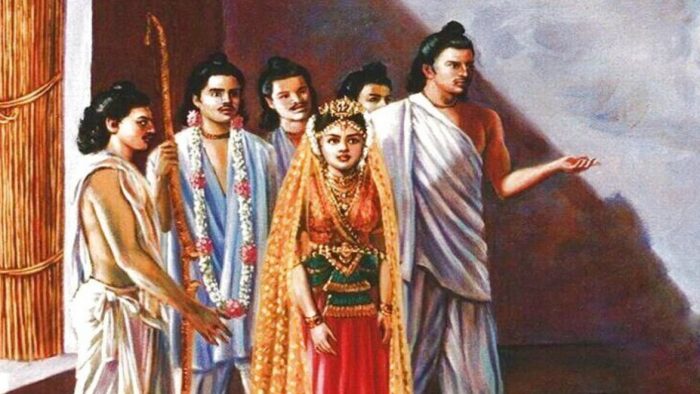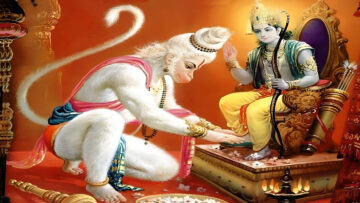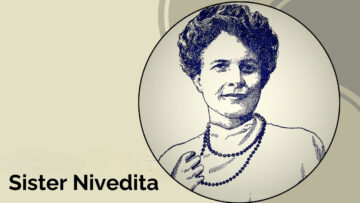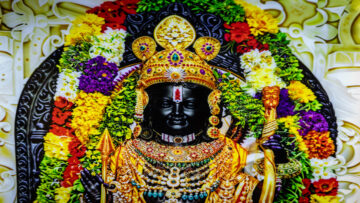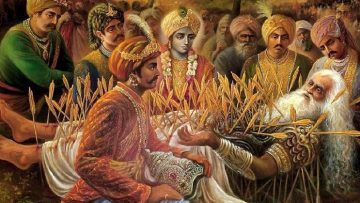Preamble
In order to understand the story of any character in Mahabharata, one needs to understand “Taaratamya” among Gods. In this article we discuss this issue based on Mahabharata Tatparya Nirnaya by Shri Madhwacharya. This article is presented as an alternative view to discussion on origin of Pandavas and Panchali.
Taaratamya in Maadhwa philosophy
In order to read Mahabharata Tatparya Nirnaya’s interpretation of the Itihaasa Purana, births, karma and happenings in lives of almost every character of Mahabharata, one needs to be aware the origin of all major characters. Shri Madhwacharya weaves Mahabharata very skillfully and beautifully with Hari Vamsha, Ramayana, and his Dvaita Vedanta.
The word “Taaratamya” might evoke a feeling of ‘discrimination’ in a political context, especially among those who have been subjected to or have learnt about caste based discrimination. While, in recent history, discrimination among Bharateeyas based on Varnaashrama bheda has been known to happen and is still happening in some circles, but Devata Taaratamya is devoid of any such malice/ ill-intent characteristic of us, humans. There is one Supreme God and every other demigod, soul is His devotee or creation.
Those who deal with politics among Gods, end up doing so with an ungodly intent. This is because; purpose of Taaratamya is to specify gradation of souls based on the number of satvika qualities among Gods. Since, Gods are Gods because humanely attachments, vices like greed, materialistic attachments among them are a lot lesser. Their pursuits are different. Gods do not play politics. Those who are depicted as playing (like Narada does sometimes, do so at the instigation of the Supreme Lord) are “nimitta maatra” (just being an instrument).
Vaishnava philosophy of Shri Madhwacharya, as the name suggests regards Bhagawan Vishnu as the Supreme Soul, Parabrahma. He is the unborn entity as Shri Krishna says in Chapter 4.6, Bhagavad Gita. He appears, manifests or incarnates. He never dies in any of His avatars. He is perfect and full of blissful qualities. Pains of any devotee who attains His company or proximity disappear. The beholder of His roopa experiences absolute bliss.
Lakshmi is eternally liberated Goddess among all, which means she is free from blemishes, pains and pleasures Jeevatmas experience. She is the abhimani devata for the “artha” earned using satvika means which ultimately is dedicated at the feet of her husband. She is placed the second in Taaratamya.
Chaturmukha Brahma who was born out of the lotus arising out of navel of Bhagawan Vishnu is the creator of the universe, which he did after he attained such powers as a result of his penance to his creator, Shri Hari. All Jeevatmas which includes Gods, demi-Gods, Gandharvas, Yakshas, Kinnaras, Kimpurushas, Prajaapati, Manu, demons, animals, birds and sea-dwellers etc., were all created by Chaturmukha Brahma and his creations.
Gods apart from Narayana are all Jeevatmas which means each Jeevatma is born and attains mukti at the end provided the Jeevatma completes his Niyata Karma with absolute devotion to Narayana without any Raajasika expectations. Almost every other Jeevatma including human beings (known as Manushya Madhyamas) do their satkarma with an intention to seek some material benefit from Shri Hari. Only Brahma and Vayu and their wives Saraswati and Bhaarati are the souls who do not seek any material benefits. They believe that their mukti is through constant contemplation of the Supreme Being. To have such kind of dedication, one needs to be an absolute renouncer without any attachment to materialism.
Vayu is especially regarded as Jeevottama (the best among Jeevatmas). Bhaarati and Saraswati are the next best in terms of the highest saatvika qualities. Among Gods, Vayu and Bhaarati are the souls who have been blessed to be bear no blemish or sin throughout their lives and any avataras they take. Bharati, Saraswati and other Ruju Gana devis take the fourth place in divine hierarchy.
Garuda, Shesha and Rudra take the fifth place. Then the six wives of Shri Krishna who are known as Shanmahishis, and so on.
Gods who have attained their divine superiority by varying degree owe their positions to their saatvika Gunas. For instance, Shakra, the present Indra – is attached to his throne somehow. Yet, he is a God who Shri Hari has a liking. This is because, Indra attains that position due to his devotion to Shri Hari and the penances he did to please the Supreme Soul. Indra, Chandra and Kaama are placed the tenth in Taaratamya.
All Gods, have therefore have higher saatvika Gunas, than mere human beings. The actions/ karma of Gods cannot be weighed on the same scale as mere mortals, because their attachments are either absent or too minimal. The miracles and magic that happen around Gods and sages is a byproduct of their satkarma.
All Gods, enjoy the company of their niyata Patnis, (eternal soulmates). Seeking another Jeevatma’s wife as one’s own wife becomes a supremely reprehensible act which burns down virtues earned by the God. The God thus loses his position. For instance, Indra lost his throne because he destroyed the satitva of Ahilya. Agni lost his appetite because he asked for salary for transmitting Yagnya Havis to Gods when Agnihotris poured Havis into Yagnya kunda– which made him weak and unfit to consume havis in yagnya kaaryas. This further led to Khaandava Dahana with assistance of Arjuna.
All Gods, including Rudra, Shesha, Garuda and their eternal wives (niyata patnis) have a constant need to stay unblemished as a Godly soul and adherence to righteous behavior, reason for boons and curses, and gradation of divine souls. For this, contemplation through japa, assisting the Supreme God in his sankalpa in any way expected by Shri Hari is their way.
Pandavas were not merely “sons” of five Gods, but they are the moolaamsha of those Gods.
The vasheekarana mantra taught to Kunti by Durvaasa was the result of a qualifier test of Kunti. Kunti served Duvaasa for thirteen years in his rigorous austerities he held in Kuntibhoja’s palace. As we know, Durvaasa was a great sage with very short temper. Anyone crossing paths with him, would surely earn curse. Treating all his needs for thirteen years with absolute devotion was a great achievement of Kunti.
Towards the end of his austerities, Durvaasa was very happy with the dedication and devotion of Kunti. He asked her any boon she wanted to seek. Knowing well that Durvaasa saw past, present and future of anyone, Kunti sought any boon which Durvaasa thought, would be of use to Kunti. Durvaasa saw the future of Kunti and realized that she would need progeny from Gods someday. He therefore taught her “Vasheekarana Mantra” which would entice any God she called on. The entire saadhana of Durvaasa and Kunti’s devotion was condensed in that mantra.
Later Kunti married Pandu. Pandu was cursed by Sage Kindama with instant death when he united with a woman. Thus, Pandu had to give up the idea of bearing his own children. Kunti told him the story of Durvaasa’s blessing. Pandu rejoiced at the idea and asked Kunti to call upon Yama Dharma. Kunti called on Yama.
धर्मेण सह संगम्य योगमूर्तिधरेण सा।
लेभे पुत्रं महाबाहुं सर्वप्राणभृतां वरम्॥ 1-129-20
dharmENa saha saMgamya yogamUrtidharENa sA|
lebhe putram mahAbAhum sarvaprAnabhrutAM varaM|| 1-129-20
Mahabharata – Kumbhakonam Recension, Adi Parva, Sambhava Parva
tataH cha sadya eva sA sushhAva putram uttamam |
yudhishhThiraM yamo hi sa prapeda Atma putratAm || MTN – chapter 12.33
ततश्च सद्य एव सा सुषाव पुत्रमुत्तमम् ।
युधिष्ठिरम् यमो हि स प्रपेद आत्मपुत्रताम् ।। १२.३३ ~महाभारत तात्पर्य निर्णयः
The minute she invited Yama, Kunti delivered yudhiShThira, endowed by the grace of Yama. In fact, Yamadharmaraaja himself obtained the sonship of kunti. [12-33]
In KM Ganguly’s Mahabharata’s Sambhava Parva [CXXIII] it is mentioned, “Then the handsome Kunti was united (in intercourse) with the god of justice in his spiritual form and obtained from him a son devoted to the good of all creatures…”. The word Sangama in the shloka “saa tu, dharmeNa sangamya, yoga mUrti dhareNa putram lebhe” of aadi parva is interpreted as sambhoga/ sexual intercourse in parenthesis.
Shri Madhwacharya’s MBTN, interprets this sangama as not sexual intercourse because Gods do not have to indulge in Sambhoga to produce progeny. They are essentially renouncers not unlike sanyaasis but they are samsaaris. Their spouses assist them in their journey to mukti. Materialistic pursuits including sexual intercourse are not the interests of Gods. Hence, sangama by Shri Madhwacharya is interpreted as union through “Niyoga” wherein the Godly soul blesses the seeking soul progeny through drishti (sight), ichcha (desire), or sparsha (touch).
Karna and all the Pandavas thus, were not sons of Soorya, Yama, Vayu, Indra and Ashwini devatas, in earthly sense, but were all moola amshas of these Gods themselves. They are colloquially described in various parts of Mahabharata as Surya-Putra/ Dharma-Putra/ Vayu-Putra, etc.
Arjuna bore Indra’s amsha, but had Avesha of Sage Nara, Hari Himself and Vayu. Presence of Indra and Nara made him a great devotee of Shri Krishna, Hari’s incarnation.
Vayu incarnated as Bheema. Vayu is Jeevottama and is the most righteous being in Mahabharata, even more righteous than Dharmaraaja himself.
Drasu and Nasatya, the twin Ashwini Gods were born as Nakula and Sahadeva respectively.
Ashwatthaama was born a year earlier than Duryodhana to Brihaspati incarnate Dronacharya. He was younger than Yudhishthira, but elder than Bheema and Duryodhana.
Why does Draupadi have five souls inside her?
Draupadi is a unique and uncommon figure, character and Goddess. Before she married Pandavas, Drupada was confused because, polyandry was not a practice then and was regarded sinful. Veda Vyaasa, another moola avataara of Shri Hari, gave divine vision to Drupada to enable him to see the presence of five Goddesses inside Draupadi – Bhaarati Devi as the carrier soul of Shyamala Devi, Shachi, Usha and Parvati, whose eternal husbands were Vayu (husband of Bhaarati Devi), Yama Dharma (husband of Shyamala), Indra (husband of Shachi) and Shiva (husband of Parvati). Bheema, Yudhishthira, Arjuna, Nakula, Sahadeva and Ashwatthaama were carried the moola amshas of all these Gods.
How did Draupadi bear five souls inside her? Why could not Paarvati amsha inside Draupadi unite with Rudra inside Ashwatthaama?
It so happened once that Shyamala Devi, Shachidevi, Ushadevi and Parvatidevi (divine and niyata (verily) wives of Yamadharma, Indra, Ashwini Devatas and Shiva respectively) flirted with their husbands deliberately and excessively in front of Chaturmukha Brahma who is their father figure. This is believed to be an act of indiscipline and against Shastras.
All of us Manushyas do not have our niyata patni’s or niyata pati’s in any birth. It is believed as per “Sumadhwa Vijaya” that we enjoy the company of our niyata patni or niyata patni only when we attain Swarga or higher lokas. Gods are always those who either live in heaven, kailaasa or Satya loka/ Vaikuntha. They always enjoy company of their niyata pati’s or niyata patni’s. Gods, most importantly, always enjoy the unending bliss of company of sages, ascetics and other Gods, who are all in the process of contemplating the qualities of the supreme soul and doing their duties as bade by the supreme Godhead.
Chaturmukha Brahma upon seeing this blatant act of indiscipline and excessive flirting by Goddesses with their husbands, cursed all the four ladies to be born as humans under the protection of ‘other men’. Other men in this context is something indigestible to Gods. Being born as humans will bring a fair share with contact with the pains of birth, disease and death, which Gods definitely do not enjoy. Materialism is truly an illusion/ “Maya” at least for Gods.
Bearing the misery of the curse by Chaturmukha Brahma, the four goddesses went on to perform penance unto Goddess Bhaaratidevi because she along with her husband bore the boons to stay free of all blemishes even in their human forms. This was perhaps done with an intent to suffer the pain of curse and yet stay unblemished through contact with the soul of Bhaaratidevi, while being in her company.
When Bhaaratidevi appeared before the four goddesses, they revealed an earlier curse too. It so happened even before this curse, that because they had tried to trick Chaturmukha Brahma by unifying their souls together in Parvati’s and approaching Chaturmukha Brahma in jest and trying to find if he could recognize them together in one soul, they had earned the ire of Chaturmukha Brahma who cursed them to all to unite in one body and be born as a human thrice. With this second curse, they were to take four births. They prayed to Bhaaratidevi that they would wish to be present within her so as to stay unblemished because, if Bhaaratidevi was to be born as a human she would always unify with Vayu – which was the eternal law of Bhagawan Vishnu. Bharati devi pleased with their penance accepted their request.
So – they first took birth together in the form of a Braahmana girl. In this form they performed penance unto Lord Rudra. Only Bhaaratidevi’s part of the soul prayed to Bhagawan Vishnu present in Lord Rudra, while others – Shyamala, Shachi, Usha and Parvatidevi performed penance unto Lord Rudra. They earned boons that despite being different souls in a single body, they would unite with their own niyata husbands in their subsequent births and serve Bhagawan Vishnu through service to them.
In the next birth they took birth as Indrasenaa also known as Nalanandini – daughter of NaLa and Damayanti. They were married to Sage MudgaLa in his next birth, who had the presence of Vayu owing to his penance unto Chaturmukha Brahma. After Sage MudgaLa assumed sanyaasa and left for a penance, Indrasenaa performed penance unto Lord Shiva. Again the soul of Bhaaratidevi performed penance unto Bhagawan Vishnu present in Lord Shiva. Lord Shiva appeared as a child to Indrasenaa asking her what boon the four of them sought and Bhagawan Vishnu present within Him asked Bharati devi the same. Strangely five voices were heard from Indrasenaa, and these were the voices of all five – Bhaarati, Shyamala, Parvati, Shachi and Ushadevi said “Patim Dehi”.
Since five boons were sought, Shri Hari present in Lord Rudra granted Bharati Devi with the boon of unifying with her Niyata Pati – Vayu, and Lord Rudra granted boons to beget husbands to the other four. All other goddesses except Bharati Devi, momentarily forgetting the curse, mistook the boon that they would be married to five individual husbands as different women. But they realised a little later that they had to serve the curse of Chaturmukha Brahma, the five of them had to be carried in one body. Now, due to the curse, they had to marry five husbands with one human body. This meant that they would have contact of “another man” risking blemish upon their soul.
When they realised what the boon truly meant, they started crying. Lord Indra appeared and asked the four souls within Indrasenaa the reason for their sorrow, which they relayed pointing her finger at the boy (the form which Lord Shiva had taken) as though complaining about Him. Unknowingly, Indra scolded the boy for causing sorrow to Indrasenaa. The boy revealing Himself as Rudra, cursed Indra to take birth as a human and be married as one of the husbands of Indrasenaa’s next life. He told Indra that those who insulted or scolded him without knowing him, were under a mountain awaiting their next birth – pointing at Vayu, Yama and Ashwini Twins. Chaturmukha Brahma witnessed this and realized that Lord Rudra lied to Indra about Vayu. He knew Vayu is an unblemished soul and would never speak harsh or scold another Godly soul and was secretly discussing their next birth with the other Gods under the mountain.
Chaturmukha Brahma cursed Lord Shiva that he would be born as a Braahmana who would suffer defeat at the hands of a lower soul [of Indra’s incarnation (Arjuna)] and his wife Paarvati’s soul would never unify with his own, in that birth. Chaturmukha Brahma cursed Shiva to stay immortal awaiting unification with Parvati.
Their next birth was that of Draupadi. King Drupada of Panchala performed a sacrifice to beget a son who would kill Dronacharya as he was burning with vengeance against his old friend. Draupadi appeared out of sacrificial fire after Dhrishtadyumna. Dhristadyumna was Agni reincarnate in Mahabharata and Draupadi was a single woman with Bharati Devi’s soul as the primary and bearer of four other souls inside her own: of Shyamala Devi, Shachi, Usha and Parvati. Only Parvati could not be united with her husband Rudra, who was Ashwatthaama because of Brahma’s curse.
After Draupadi was married to Pandavas, she lived with each of the Pandavas for a year. When she was with Yudhishthira, she would assume the soul of Shyamala devi, while the rest of Goddesses would remain dormant. Similarly, with Bheema, Bhaarati Devi would be active, while the rest of the Goddesses would be dormant. With Arjuna – Shachi Devi would be active and with Nakula and Sahadeva, Usha Devi was active and the rest Goddesses would remain dormant.
Thus, in puraanic sense, Draupadi’s marriage was definitely not polyandrous. It was the divine union of souls meant to be made for each other.
Draupadi, in her next birth was born as Chandraa.
Reference:
- Taratamya: https://madhwafestivals.com/2016/08/27/taratamya/
Disclaimer: The opinions expressed in this article belong to the author. Indic Today is neither responsible nor liable for the accuracy, completeness, suitability, or validity of any information in the article.

